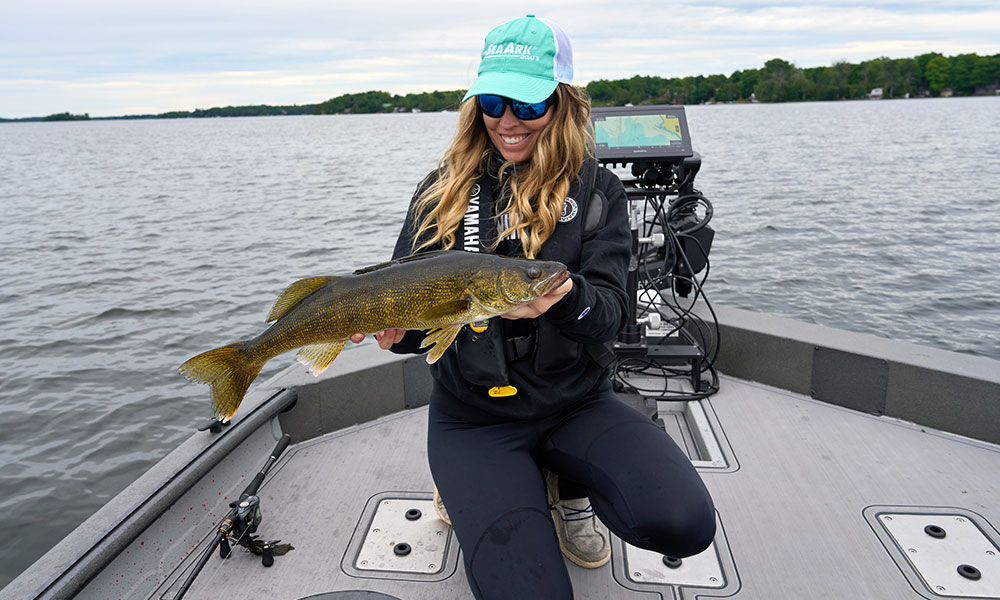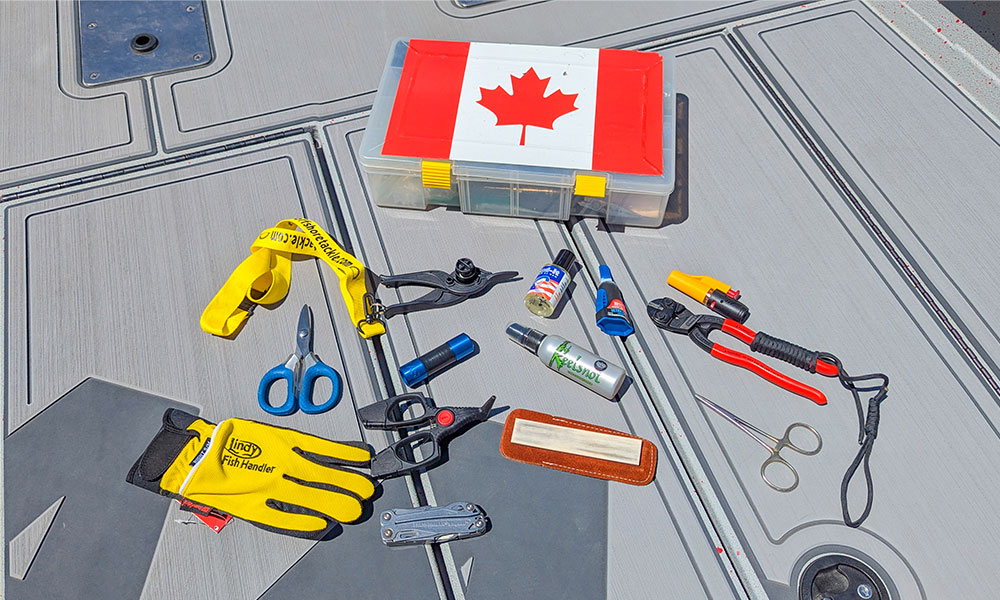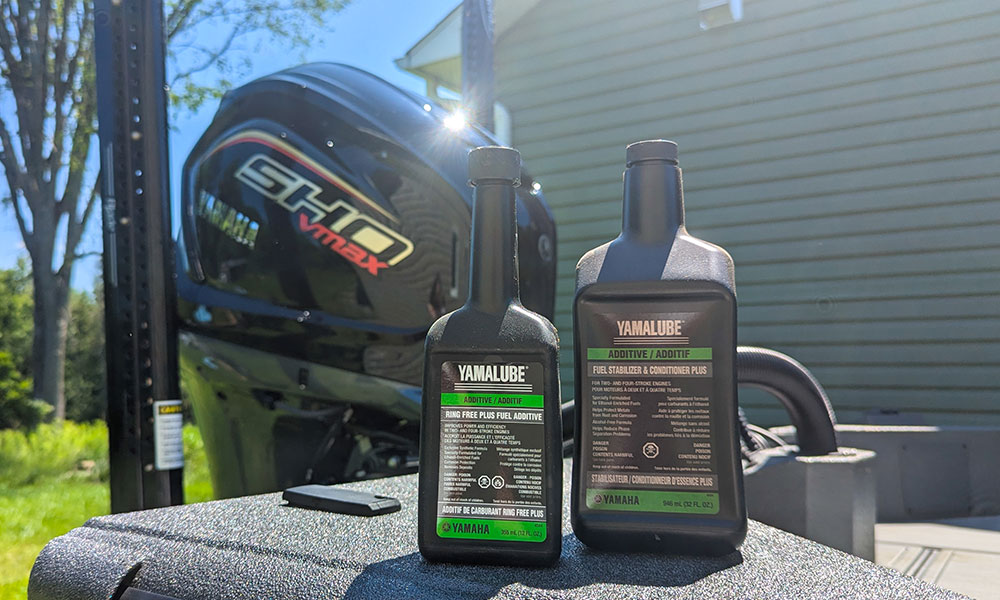Yamaha Pro Angler

Everyone who fishes knows the mantra, “There’s no such thing as too much equipment.”
Even as a multi-species angler, there are several items I always have on my boat no matter what type of fish I’m targeting. There have been times where I’ve forgotten items like lifejackets and boat keys at home and had to go back for them. Oops!
Now, I keep a list on my phone for impromptu fishing adventures so that I’m ready to hit the water the moment I arrive at the dock to launch my boat. I’ve put together my list of fishing essentials to have aboard your boat for your next fishing trip.
Transport Canada has minimum safety equipment requirements depending on your boat type and the length. You can refer to their website to ensure you have all the legally required items for your vessel: Boating Safety Resources
Note: Don’t forget to check your flashlight batteries to ensure it’s in working condition.
Canadian Coast Guard Approved life jackets or personal floatation devices (PFDs) of appropriate size are outlined in the Transport Canada safety equipment requirements, but I wanted to mention it separately because these should be at the top of your mind – and your list!
In addition to the required safety equipment, you may also want to consider a first aid kit and satellite communicator. A basic first aid kit takes up very little space but can certainly help turn the day around if someone on the boat encounters even a minor injury.
Some of the waters I explore are out of cell reception range, which is part of the draw to these beautiful locations. However, having a satellite communicator – such as the Garmin inReach Mini 2 – can offer peace of mind if you need to get in touch with family and friends, or reach out for help.
Having a spare prop and a prop wrench aboard your boat can really save the day in case your propeller gets damaged while you’re out on the water.
The most common cause of propeller damage comes from striking an underwater hazard. Of course, you should always exercise care and caution when navigating uncharted waters. But not all submerged hazards (such as rock shoals or deadheads) are properly marked, especially on more remote bodies of water, so accidents can happen regardless of your experience level.
I like to bring a small kit with me that includes tools for minor on-the-water repairs. This includes:
- 5” Knipex Pliers Wrench
- Multibit Screwdriver
- Allen Keys
- Electrical Tape
- Spare Fuses
- Zip Ties, Velcro Ties, and more

Along with these basic tools, I also carry some fishing-specific tools to make my adventure more seamless and secure. Regardless of what and where I’m fishing, my large waterproof tackle tray contains the following items.
- Braid Shears
- Knipex Wire Cutters
- Foreceps
- Crazy Glue Gel
- Mend-It Soft Bait Glue
- Line Conditioner
- Fish Handling Glove
- Wacky Rig Tool
- Multitool
- Knot Puller Bars
- Torch Lighter
- Hook Sharpening Stone
- Offshore Tackle EZ Crankbait Tuner
- Split Ring Pliers
The Knipex wire cutters are not only helpful for cutting and removing hooks from fish that are fixed deep but are also helpful if you hook them yourself. The Knipex brand in particular cuts with ease and can be used one-handed as well.
Additionally, I like to keep a couple of desiccant packs and plastic VCI emitter tabs in my fishing toolbox to prevent any of my tools from rusting while not in use.
Bringing layers, appropriate outerwear or a rain suit can help you maximize your time on the water – even when conditions change. It’s a great idea to throw together a dry bag of gear that can be tucked away until you need it. A quality pair of polarized sunglasses not only cut down on glare and make it possible to see what’s below the surface, but they also protect your eyes from harmful UV rays. Wearing sunglasses can also help protect your eyes from casting mishaps.
I always keep a set of bumpers and ropes aboard my boat in case I need to dock to get fuel, take a washroom break or head ashore for any other reason.
Attaching a floating key chain to your boat and your vehicle keys is a great way to ensure they don’t end up on the bottom of the lake or river should they inadvertently fall overboard. Considering my past forgetfulness, I wanted to include an extra note on the boat keys, so you don’t leave them at home (like I’ve done once or twice in the past).
Drain plugs are tiny but quite important when you’re on your boat. They can easily be lost or misplaced, so it’s best to have a spare tucked away just in case!

Every time I fuel up my boat, I like to add the recommended amount of Yamalube Ring Free Plus Fuel Additive and the Yamalube Fuel Stabilizer & Conditioner Plus. Both additives help to ensure optimal long-term performance of my outboard. That’s why, I always keep at least a bottle of each within easy reach in my boat or truck.
Here’s to responsible, fun fishing – tight lines, everybody!


 All Yamaha News
All Yamaha News